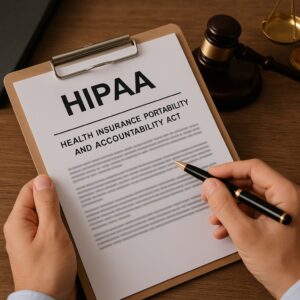HIPAA compliance issues don’t just impact hospitals and clinics. In family law and estate disputes, lawyers increasingly face challenges tied to protected health information (PHI). Whether navigating a contested divorce, guardianship proceeding, or probate battle, attorneys and courts must understand the limits of data access and the legal consequences of overstepping them.
Unlike covered entities such as healthcare providers, business associates like law firms may not interact with PHI daily. But when they do, HIPAA still applies. Mishandling sensitive records, even unintentionally, can trigger audits, fines, and reputational damage.
HIPAA Obligations in Probate and Divorce
In estate planning and probate cases, attorneys sometimes need access to medical records to confirm capacity or determine eligibility for benefits. Many law offices are addressing these challenges by integrating HIPAA compliance checklist standards into their intake and documentation workflows. In divorce litigation, mental health histories may be relevant to custody or alimony claims. These situations create legal gray areas.
HIPAA does not allow just anyone to request a decedent’s records. Access is typically limited to the executor or a court-appointed representative. In divorce proceedings, records must be adequately subpoenaed and disclosed under strict protective orders. Developing clear procedures for record requests helps reduce errors and unauthorized access.
Even when parties agree to share records, law firms must confirm that consent is valid and documented. Without proper safeguards, a routine request can escalate into a data breach—and potentially derail a case.
Common Risks for Legal Professionals
One of the most overlooked HIPAA risks in family law is poor digital hygiene. Forwarding unencrypted emails, storing files on personal devices, or leaving case notes unsecured in shared drives can all result in violations.
In one case, an attorney representing a client in a guardianship petition emailed medical documents to opposing counsel without redacting sensitive data. The opposing party misused those details, leading to a complaint and a disciplinary investigation. Even if unintentional, that type of disclosure can trigger regulatory scrutiny.
Legal professionals who serve as business associates are also subject to HIPAA breach notification rules. That means law firms must report certain violations to clients, the government, and in some cases, the media. These obligations are easy to overlook but critical to manage. Having a designated compliance officer or external consultant can help firms stay current with evolving privacy regulations.
Technology and PHI Access Controls
IT systems are central to compliance. Password-protected documents and secure file-sharing platforms are the baseline. Law firms must also maintain audit trails that show who accessed what and when.
Remote work has further complicated the compliance landscape. Attorneys using unsecured Wi-Fi, shared home computers, or outdated software pose risks not just to clients but also to their practice. Integrating secure access protocols for legal teams can reduce vulnerabilities while enabling flexibility.
When cases involve expert witnesses, mediators, or third-party evaluators, PHI often travels beyond the core legal team. Everyone handling that information should be trained on their responsibilities, and technology should limit access accordingly. Additionally, rotating encryption keys and setting document expiration timelines can help prevent long-term exposure of sensitive files.
Collaboration Between Legal and Compliance Roles
Family law practitioners don’t always see themselves as HIPAA stakeholders. But when a subpoena is issued or discovery involves health data, they become part of the compliance ecosystem.
Coordinating with compliance consultants or privacy officers can help law firms create standard operating procedures. This collaboration prevents case-specific scrambling and promotes consistent, defensible practices.
Legal assistants, paralegals, and support staff should also be looped into these conversations. They’re often the ones handling the logistics of PHI requests, and their diligence—or oversight—can make or break compliance. Creating a documented training program specific to legal HIPAA exposure helps reinforce these responsibilities across the team.
Legal Exposure and Ethical Duties
HIPAA violations don’t just carry regulatory consequences. They also create ethical and legal liabilities. Attorneys who mishandle PHI may face malpractice claims, bar complaints, or even disqualification from ongoing proceedings.
Courts have sanctioned legal teams for improper discovery requests or for failing to safeguard sensitive information during litigation. Even accidental disclosures can be construed as negligence. Understanding and applying HIPAA standards protects both clients and law firms.
It’s important to remember that PHI isn’t limited to medical charts. Therapy notes, disability accommodations, and insurance forms may all fall under HIPAA protection. Treating these records with care reflects not only legal compliance but also professional integrity.
Treating Compliance as a Core Competency
HIPAA isn’t just a healthcare issue. In today’s data-driven legal environment, it’s a core competency for any attorney handling sensitive personal information.
Law firms involved in family law and estate matters should integrate compliance into case workflows. This includes client intake, discovery protocols, data storage, and communication practices. Clear policies backed by secure technology can reduce risk at every step.
More importantly, strong compliance builds trust. Clients expect their private details to remain confidential. When law firms take HIPAA seriously, they send a clear signal of professionalism and accountability.
This trust becomes even more important in family disputes, where emotions run high and reputations are fragile. Demonstrating control over private information can make the difference between a resolved case and an escalated one. It also positions the firm as a reliable partner in sensitive matters.







